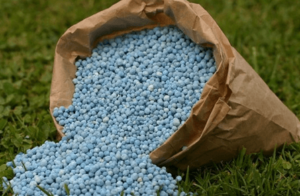Ghana government said to need $2b to establish fertilizer plant
 The government will need about $2 billion to establish a fertilizer plant in Ghana to increase the volume of production and resolve the intermittent shortage of the commodity, which affects food production and security.
The government will need about $2 billion to establish a fertilizer plant in Ghana to increase the volume of production and resolve the intermittent shortage of the commodity, which affects food production and security.
Currently all inorganic fertilizers are imported with the Nitrogen Phosphorous and Potassium (NPK) taking about 50 per cent of the imports, while Urea, Ammonia and the rest cumulatively take the remaining 50 per cent.
In 2020 Ghana imported about 620,000 metric tonnes of fertilizer to feed the agricultural sector, especially for the Planting for Food and Jobs, which had significant impact on production.
To mitigate the impact of fertilizer import on national coffers, the Government, in September 2018, signed a Memorandum of Understanding in Kigali with the OCP Group, a fertilizer producer, to develop a world scale manufacturing plant in Ghana to save the country the huge foreign exchange in importing the commodity.
Following from that, studies on Gas Due Diligence, Geotechnical, Topography & Hydrology, and the Conceptual framework have been completed to pave the way for the establishment of the plant.
Mr Michael Owusu, the Deputy Chair of the National Fertilizer Council, said this in a presentation on the Fertilizer Market, History and Potential in Ghana at a Roundtable in Accra on Monday to address the challenges impacting local supply chains in the country’s fertilizer and agro-inputs sectors.
It was on the theme: “The Future of Fertilizer and Agro-inputs in Ghana Towards the Soil Health Summit,” organised by the African Fertilizer and Agribusiness Partnership (AFAP), in partnership with Feed the Future Policy LINK, a US Government’s global hunger and food security initiative.
Comprehensive answers on key issues from sector stakeholders and industry players during the dialogue would feed into the Soil Health Summit to be held in Senegal in June, 2023.
Mr Owusu said the Planting for Food and Jobs (PFJ) initiative by the Government had contributed to improving fertilizer application from eight kilogrammes per hector in 2016 to 25 kg per hector in 2020, with a huge positive impact on employment for actors in the value-chain.
Ghana experienced fertilizer shortage in 2021, with unaffordable prices and high subsidy rates, leading to farmers decreasing their fertilizer usage, hence the record of lower outputs.
He said fertilizer production must be crop specific to ensure farmers increased productivity adding that the Fertilizer Council was undertaking a national advocacy to promote organic fertilizer use, especially for vegetables, to facilitate all-year round production.
The Council is also promoting Integrated Soil Fertility Management System to combine both organic and inorganic fertilzers to increase production levels and improve soil fertility.
Mr Yaw Frimpong, the Deputy Minister of Food and Agriculture, said the Ministry would review the plan to establish the fertilizer plant because Ghana was blessed with gas deposits, which would facilitate the establishment of the plant and help to cut down cost.
He called for private sector support in combining the production of organic and inorganic fertilizers to improve soil health.
“The government is committed to investing in agriculture and supporting the development of innovative solutions to improve soil health and increase agricultural productivity,’’ Mr Frimpong said.
He expressed the hope that rich experiences would be shared by conference participants to address the challenges facing the fertilizer and agro-inputs sectors.
Professor Richard Mkandawire, Director, Alliance for African Partnership, recommended the building of robust small and medium scale enterprises in the fertilizer value-chain to boost production.
He appealed to the government to drive the change and transformation of the agriculture sector by leading the advocacy, building infrastructure to ensure accessibility and affordability of fertilizer, and investing in research and extension services to enhance the growth of the sector.
Mr Michael Sudarkasa, the Chief Executive Officer, AFAP, said the organisation was committed to working with all stakeholders to develop practical solutions to the challenges facing agriculture in Ghana and called for partnerships and collaboration in achieving the set objectives.
Mr Yunus Abdulai, Country Lead, Feed the Future Policy LINK, mentioned agriculture trade facilitation, seeds, fertilizer, access to finance, and climate change as the five key areas the organisation focused on to ensure holistic solution to the sector challenges.
Dr Godfred Seidu Jasaw, Ranking Member, Parliament Select Committee on Food, Agriculture and Cocoa Affairs, urged the Government to prioritise the support of private companies, especially SMEs engaged in organic fertilizer production, to complement the usage of the inorganic ones.
That, he said, would ensure availability and affordability of the commodity by small-holder farmers to improve yield.
About 130 key stakeholders from across the Sub-region are participating in the three-day AFAP Regional Public-Private Dialogue.
Source: GNA
